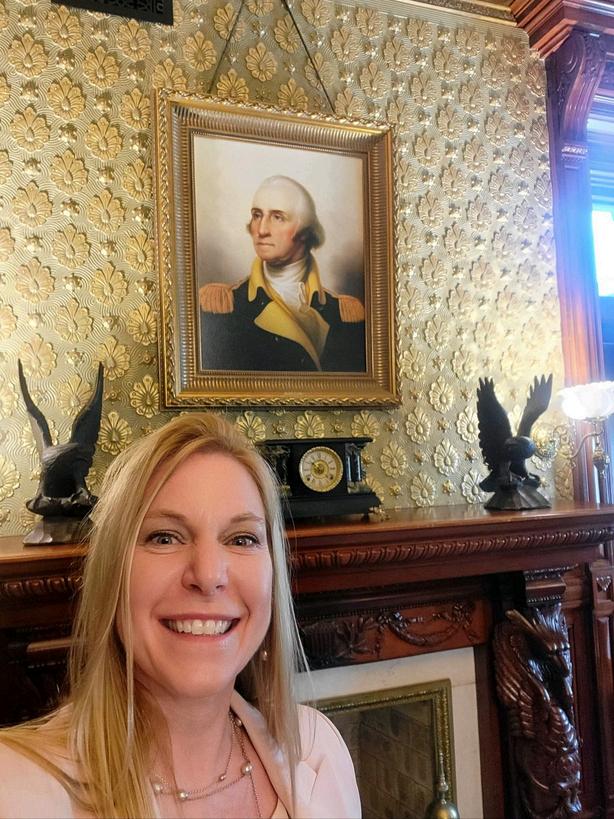





Therapy Partners Group, represented by Kim Kollwelter, COO, alongside the Alliance for Physical Therapy Quality and Innovation (APTQI) and other industry leaders, took on Washington D.C. as a unified team April 15 and 16 to advocate for the Stopping Addiction and Falls for the Elderly (SAFE) Act (H.R. 7618). If passed, the bill would provide seniors who have fallen in the past year an annual fall risk assessment by a physical or occupational therapist at no cost to them. Amidst the deluge of over 10,000 bills presented each year, getting the focus on healthcare and physical therapy is crucial, aiming to propel patient-centric initiatives to the forefront of legislative agendas.
The SAFE Act seeks to enhance access to physical therapy services for patients nationwide, aligning closely with the people-centered ethos that TPG champions. As a company dedicated to advancing healthcare and improving patient outcomes, TPG recognizes the importance of advocating for policies that prioritize patient well-being.
Kollwelter expressed the significance of the advocacy efforts, stating, "Our mission at TPG aligns seamlessly with the goals of the SAFE Act. By advocating for patient-focused legislation like this, we can ensure that individuals have access to the high-quality physical therapy services they need to thrive." 4

3 - Q&A with Kim Kollwelter


The discussions centered on the impact of the legislation on patient care, highlighting the critical role that physical therapy plays in promoting overall health and well-being
During the meetings on Capitol Hill, Kim Kollwelter, fellow executives, and representatives from APTQI engaged with various stakeholders and policymakers to raise awareness about the importance of the SAFE Act.

Congresswoman Melanie Stansbury emphasized the importance of connecting with policymakers on a personal level, stating, "When you are meeting with people, educate their minds, but touch their hearts " This sentiment underscores the collaborative efforts of TPG, APTQI, and other advocates to foster meaningful dialogue and drive positive change in healthcare policy.
As the advocacy efforts continue, TPG remains committed to supporting initiatives that advance the physical therapy profession and improve patient access to care By actively participating in advocacy efforts like those surrounding the SAFE Act, TPG reaffirms its dedication to making a difference in the lives of patients and communities nationwide.



Q: WHY IS THIS AN IMPORTANT INITIATIVE?
A: NOT ONLY IS THIS IMPORTANT TO OUR PROFESSION, IT’S TREMENDOUSLY IMPORTANT TO OUR PATIENTS. THIS WAS AN UNPARALLELED LEARNING OPPORTUNITY FOR EVERYONE INVOLVED. I GOT A CRASH COURSE IN LOBBYING AND EVERYONE WE MET WITH GAINED KNOWLEDGE ON PHYSICAL THERAPY.

Q: WHO DID YOU MEET WITH?
A: IT WAS A WHIRLWIND 48 HOURS! OUR GROUP DIVIDED AND CONQURED TO SCHEDULE AS MANY MEETINGS AS POSSIBLE. WE WERE ABLE TO SIT DOWN AND TALK WITH AARP, FAMILIES USA, GERONTOLOGICAL SOCIETY OF AMERICA (GSA), THE U.S. DEPARTMENT OF HEALTH AND HUMAN SERVICES, AND STAFF AT THE WHITE HOUSE.
Q: WHAT WAS THE MOST IMPACTFUL TAKEAWAY?
A: THAT WE ARE ON THE RIGHT TRACK! IN THESE SITUATIONS, YOU ONLY GET ONE CHANCE TO PRESENT SO IT’S CRITICAL TO GAIN INTEREST RIGHT AWAY. WE WERE ASKED TO COME BACK WITH FOLLOW-UP INFORMATION AND SUPPORTING DATA, SO THAT’S A WIN.


Every 19 minutes, an older adult will die as a result of a fall.

According to the Centers for Disease Control and Prevention, more than 1 out of 4 older Americans fall each year. Falling once doubles the chances of falling again. Every 19 minutes, an older adult will die as a result of a fall. A fall can result in unwanted outcomes, including injury, loss of independence, use of opioids, and decreased ability to do meaningful activities. All told, accidental falls among older adults result in 3 million emergency room visits and 1 million hospital stays. The average falls-related hospitalization costs $30,000 and falls rank fifth in terms of highest personal health care spending. Older adult falls cost $50 billion in medical costs annually, with 75% paid by Medicare and Medicaid.
Preventing falls is key, however, access to falls screening and prevention services under Medicare is currently limited. Increasing access to physical therapy for falls prevention screening and services to Medicare beneficiaries prone to falls could measurably reduce Medicare costs. Two current programs under Medicare could be improved to ensure better falls screening and prevention for beneficiaries: the Initial Preventive Physical Examination, also known as the Welcome to Medicare visit or IPPE, and the Medicare Annual Wellness visit, or AWV. Expanding access to falls prevention screening and services for Medicare beneficiaries would reduce the number of falls each year and save the Medicare program millions of dollars a year by preventing hospitalizations.
TPG and the American Physical Therapy Association strongly supports the Stopping Addiction and Falls for the Elderly Act, or the SAFE Act (H.R. 7618), aimed at expanding and increasing access to falls screening and prevention in order to reduce the use of opioids that often occur as a result of a fall. The SAFE Act was introduced in the U.S. House of Representative by Reps. Carol Miller, R-W.Va., and Melanie Stansbury, D-N.M.
source: www apta org/advocacy/issues/falls-prevention
A new report from The Moran Company, an HMA Company, found physical therapy is associated with significant reductions in hospitalizations, emergency room visits, and opioid use in the Medicare population when it is utilized after a fall By helping seniors stay out of costly sites of service such as inpatient hospitals and emergency rooms, physical therapy leads to a measurable reduction in total healthcare spending
Helping older Americans avoid falls is essential for improving Medicare beneficiary health and addressing growing healthcare spending.
Senior Falls are a Dangerous and Costly Problem

52Million
12Million
According to Research by The Moran Company, an HMA Company, Physical Therapy Benefits Seniors and Taxpayers 50%








Join us for a sneak peek into all things residency and fellowship. Come with your questions and stay for the stories! Hear directly from TPG residency faculty, residents, and fellows themselves.

Hosted by Dr. Jen Allen: PT, Chief Clinical Officer
Dr. Melissa Buss: Sr Director of Residency & Fellowship Clinical Education
Dr. Fatema Ghani: Dir. University Relations
Along with: Current & past TPG Residents & Fellows
Reserve your spot!




